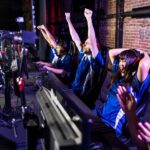
In the realm of pixels and avatars, online games have become more than just a form of entertainment; they are dynamic ecosystems that influence behavior and shape social interactions. From massively multiplayer online games (MMOs) to casual mobile gaming, the virtual worlds created within these games have a profound impact on individuals and communities; similar effects for players have a roulette cheat sheet. This article explores how online games, through their immersive nature, contribute to the formation of behavior patterns and influence the social dynamics of their players.
The Digital Playground: A Canvas for Behavior
Online games greatly influence behavior and social dynamics by shaping how people interact and form communities. They encourage teamwork, communication, and strategy. Players from different backgrounds learn to collaborate, improving social skills and cultural awareness. Explore 55club.app to foster a sense of belonging and identity within these virtual environments. These connections often lead to lasting friendships and support networks, highlighting the powerful impact of online gaming on our lives and emphasizing the importance of social engagement in digital spaces.
Avatars as Extensions of Self
The creation and customization of avatars within online games offer players the opportunity to express their identity and creativity. From choosing appearances to selecting outfits, players invest time and thought into crafting avatars that represent an idealized version of themselves or an alter ego. This process of avatar creation is not merely cosmetic; it plays a crucial role in shaping how individuals perceive themselves and how they wish to be perceived by others within the gaming community.
The behavior exhibited by avatars often reflects the player’s values, preferences, and social inclinations. Whether players adopt altruistic roles, embodying the hero archetype, or lean towards more mischievous and rebellious personas, avatars become a canvas for expressing and exploring aspects of personal identity in a virtual context.
Social Dynamics Within Gaming Communities
Online games are more than solitary endeavors; they are thriving communities where players interact, collaborate, and compete. These virtual societies come with their own set of social norms, hierarchies, and communication styles that significantly influence the behavior of participants.
One of the defining features of online gaming communities is the formation of guilds, clans, or alliances – groups of players who band together for common goals. Whether it’s conquering in-game challenges or engaging in player-versus-player (PvP) battles, these digital associations mirror real-world social structures. Within these groups, players often find a sense of belonging, camaraderie, and shared objectives, influencing their behavior as they collaborate to achieve collective success.

Conversely, the competitive nature of some online games fosters rivalries and conflicts, leading to the emergence of digital feuds and alliances. The dynamics within these groups contribute to the development of social skills, teamwork, and leadership qualities, as players navigate the complexities of virtual relationships.
Communication And Collaboration: A New Language Emerges
Online games create a unique communication environment where players interact through text, voice chat, or even non-verbal cues represented by in-game gestures. This distinct form of communication shapes the social dynamics within gaming communities, influencing how individuals express themselves and collaborate with others.
The anonymity provided by online gaming platforms can lead to uninhibited communication, allowing players to experiment with different personas or communication styles. This freedom can contribute to the development of social skills as individuals learn to navigate diverse social scenarios within the virtual realm. Moreover, the collaborative nature of many online games necessitates effective communication and coordination, fostering teamwork and interpersonal skills.
Behavioral Impact Beyond The Screen
The influence of online games extends beyond the confines of the gaming screen, impacting individuals in their offline lives. As players spend considerable time within these virtual worlds, the behavioral patterns and social dynamics cultivated in the gaming environment can manifest in real-world interactions.

The skills acquired within online games, such as strategic thinking, problem-solving, and leadership, often prove transferable to real-world scenarios. Studies suggest that individuals who engage in online gaming may exhibit improved cognitive abilities, decision-making skills, and a capacity for multitasking. As players navigate complex in-game challenges, they inadvertently develop skills that can enhance their capabilities in academic, professional, or personal pursuits.
Socialization And Community Engagement
Contrary to the stereotype of solitary gamers, online gaming fosters socialization and community engagement. Many gaming platforms feature forums, social media integrations, and live events that extend the community beyond the virtual realm. Players form connections, share experiences, and even organize offline gatherings, creating a bridge between the online gaming community and real-world social networks.
Online gaming communities have the potential to be diverse and inclusive spaces that bring together individuals from different backgrounds, cultures, and experiences. Developers and players alike can contribute to the creation of positive and welcoming environments where diversity is celebrated, and harassment is actively discouraged. Inclusive communities foster a sense of belonging for players, encouraging positive behavior and mutual respect.













